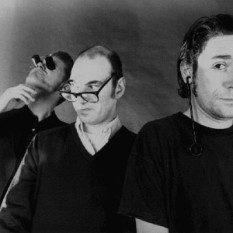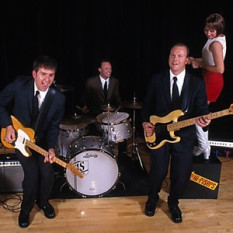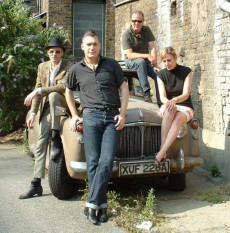The Kaisers were a Scottish beat/garage rock group, known for their masterful replication of the sights and sounds of the British beat boom of the early '60s, right down to their throwback album covers and merchandise. Their music, a potent mix of classic rock 'n' roll covers and originals, was intentionally subjected to the technological limitations of the '60s, being recorded live in the studio with an absolute minimum of overdubs and mixed in monaural sound. All members of the band, whose line-up was subject to a number of changes, bore the title "Kaiser" as a prefix to their given names.
Formed in 1992 in Edinburgh, Scotland, the original Kaisers were Matt Armstrong (guitar), John Gibbs (bass), Johnny Maben (drums), and George Miller (lead guitar), the latter two of which were the only constant members of the group. The Kaisers were influenced by lesser known beat groups such as Bern Elliott & The Fenmen, The Big Three, and The Undertakers, among others. The Kaisers quickly gained a sizable fan following owing to their raucous, energetic live act, all the while fully developing their sound and building an ever-growing library of original compositions. Eventually, they were signed to the London label No Hit Records.
The Kaisers recorded their first album, Squarehead Stomp! (1993), at Toe Rag Studios, a now-legendary recording facility in Hackney, London, also used by fellow garage rock revivalists such as The Bishops, The Datsuns, and The Ettes. The original pressings of a majority of Kaisers albums were released on the No Hit imprint Imperial Wireless, which dealt exclusively in Kaisers records. To promote their first album, as well as the Alligator Twist EP released concurrently, The Kaisers appeared on an edition of BBC Scotland radio show The Usual Suspects; here, Miller stated that "...We're not The Beatles, we're not Gerry & The Pacemakers, we're The Kaisers."
It was after the release of their second album, In Step with The Kaisers (1994), that the first of many line-up changes occurred; bassist Gibbs was replaced by Matt Curtis (informally known as Kaiser Matt 2 to avoid confusion with Armstrong). With the release of Beat It Up! (1995), likely their most popular and well-regarded album, they further enhanced their burgeoning popularity, enabling them to depart on their first ever U.S. tour, where they played legendary punk venue CBGB. Upon their return to the UK, founding member Armstrong -- whose particular style of playing was essential to their sound -- left on sabbatical, leading them to hire Keith Warwick just before leaving for a tour of The Netherlands. Curtis also quit the band shortly thereafter, to be replaced by Mark Ferrie.
This cemented The Kaisers' line-up for the better part of four years, when Warwick was replaced by Angus McIntyre in 1999, whose tenure was short-lived; later that same year he was replaced by a returning Matt Armstrong, however briefly. The sixth and final line-up included Dean Micetich and a returning Ferrie. Although the band had been exceedingly productive in their early days--having once recorded three full-length albums, two EPs, and a single within the span of three years--from 1996 on, their level of productivity slowed considerably, releasing only two studio albums in the span of six years.
One of these albums, however, was Wishing Street (1997), their most critically lauded album. It included only two cover songs and instead favored originals; this was done intentionally in response to media criticism that their earlier records contained a perceived over-abundance of covers, despite the fact that said albums had contained a progressively increased number for each new record (a majority of which had been composed by Miller). Wishing Street was also recorded in higher fidelity than previous installments, as the group had become wary of contemporary acts recording at lo-fi as a way to disguise mistakes.
The Kaisers never officially disbanded; after the conclusion of the recording sessions for what turned out to be their last studio album, Shake Me! (2001) -- their focus having shifted to other musical projects, or due to real-life reasons -- The Kaisers quietly parted ways in 2002, and have not worked together under that name since.
Sites: Facebook. .
Todos los álbumes
Puedes encontrar información a través del mejor buscador de música - Muzlan.top 😊Todos los materiales a pedido "The Kaisers" están disponibles en la página The Kaisers
Sí, por supuesto. Puedes escuchar pistas en la página The Kaisers
Sí, por supuesto. Puede descargar pistas en la página The Kaisers
Esta página se encuentra por consultas: The Kaisers song download, The Kaisers all mp3, The Kaisers songs download, The Kaisers mp3 download, The Kaisers song listen




